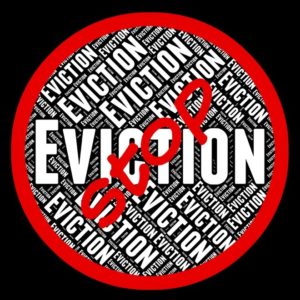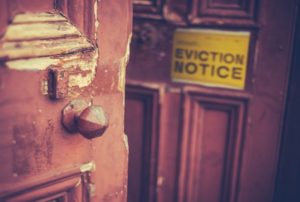As the Coronavirus pandemic continues to change the way our society functions, the legislature and the Massachusetts trial courts have enacted numerous orders to address the spread of the Coronavirus. The Commonwealth’s highest court endorsed an Order on April 1, 2020 which declared that only emergency matters will be heard by the Courts until May 4, 2020. The separate divisions of the trial courts (i.e., Superior Court Division, District Court Division, Housing Court Division) are responsible for defining which matters constitute an emergency.

Landlords have been faced with a difficult situation and are fighting to deal with the unknowns related to the temporary changes in eviction law. Here at Goldman & Pease, we offer you the most up-to-date information related to this pandemic and how it impacts landlords.
Housing Court Standing Order
The Chief Justice of the Housing Court issued a Standing Order on March 18, 2020. The Order is currently in effect and addresses which matters the Court will hear while the Order is in place. The Order (as discussed infra) sets forth that until at least April 6, 2020, only emergency matters will be heard by the Court. In compliance with the recent Supreme Judicial Court order, the Housing Court will soon extend the Standing Order through May 4, 2020.
What Matters Can be Heard in Housing Court
Given that the Standing Order allows only emergency matters to be heard, it begets the question: What constitutes an emergency matter?
The Standing Order sets forth an express list of matters which are deemed “emergency.” This list includes the following:
- Applications for injunctive relief;
- Applications for a temporary restraining relating to a lockout, condemnation, lack of heat, water, and/or other utilities;
- Conduct and/or conditions endangering the health, safety, and welfare of residential occupants and others;
- Applications to stay the levy of an execution;
- Applications for immediate access to address emergencies (e.g., burst water pipes, gas fumes, etc.).
Any matter other than those listed above will not be heard by the Court at the current time. The Standing Order further sets forth that discretion is assigned to the Clerk Magistrate and First Justice to determine whether a matter constitutes an emergency and merits a hearing.
Effect of the Standing Order on Executions for Possession and Money Judgment
Subsection three of the Standing Order extends the expiration date of all Executions set to expire before April 21, 2020 to that date. Again, we believe this date will be extended to May 4, 2020 due to the recent Supreme Judicial Court Order. This means that if you currently have an Execution for possession and Money Judgment which expires during the pendency of the Standing Order, the expiration date is extended through the date the Standing Order is rescinded.
Currently, the Standing Orders of the relevant Courts do not prohibit a landlord from levying on an Execution. However, with the pandemic growing at an exponential rate, any tenant faced with an imminent eviction will undoubtedly receive a stay of execution until after the state of emergency has been rescinded.
The House of Representatives and the Senate have each proposed a bill to prohibit any Execution from issuing and also to enact a moratorium on evictions and foreclosures. The House and Senate would need to agree to one bill or merge their respective proposals before it can be presented to Governor Baker and be enacted into law. The proposed language of the Bills from the House of Representatives and the Senate prohibit any eviction during this pandemic and impose stiff fines for landlords found in violation. We encourage you to contact the experienced and knowledgeable attorneys at Goldman & Pease if you are a landlord with a pending eviction action.
Remedies Available to a Landlord for Nonpayment of Rent
While the Commonwealth’s state of emergency was declared in an effort to protect the health, safety, and wellbeing of its residents, this also can lead to severe ramifications for landlords. The increase in unemployment rates has left many individuals with little to no money to pay their monthly expenses including mortgages and rent. A landlord is currently unable to file and proceed with a Summary Process eviction for nonpayment of rent as this is not considered an “emergency” under the Standing Order. In addition, the Attorney General’s Office recently issued an Emergency Regulation which prohibits creditors from engaging in methods of debt collection. Landlords who serve a notice to quit for nonpayment of rent are engaging in debt collection and would likely be categorized as the type of conduct which the Emergency Regulation now forbids.
A landlord dealing with tenants who are behind on their rent should utilize good-faith efforts in attempting to collect. It is appropriate to send the tenant a past due notice in lieu of a notice to quit. Also, it may behoove the landlord to communicate with their tenant via email and set up a reasonable payment plan. To ensure you are complying with the ever-evolving orders from the Commonwealth’s courts, you are encouraged to contact Goldman & Pease to insulate yourself from traps for the unwary.
What Happens to Pending Summary Process Actions?
All Summary Process matters currently pending are continued to a date no earlier that April 22, 2020 (again, this date will likely be extended to May 4, 2020). If you have filed an action for nonpayment of rent in the Housing Court, you may expedite the waiting period if you are willing to enter into an Agreement for Judgment for repayment. The Housing Court is currently allowing parties to file an Agreement for Judgment so long as at least one party is represented by counsel. This can preserve a landlord’s rights to payment of rent and arrears while avoiding the delay in waiting months to appear in Court. Prior to entering into an Agreement for Judgment, an attorney should be consulted. Here at Goldman & Pease, our attorneys have extensive experience in drafting thorough and comprehensive Agreements for Judgment to ensure landlord’s rights are protected.

How to Handle Commercial Evictions
Commercial evictions are filed in the District Court Department or the Superior Court Department depending on the damages claimed. They are not filed in the Housing Court. The District and Superior Courts have each issued their own Standing Orders which similarly set forth that all non-emergency matters are continued to a later date. While the Attorney General’s Emergency Regulation would not apply because a commercial eviction does not involve a consumer debt, we highly recommend you contact an attorney at Goldman & Pease. We are here to assist you in your needs for a competent commercial eviction attorney.

